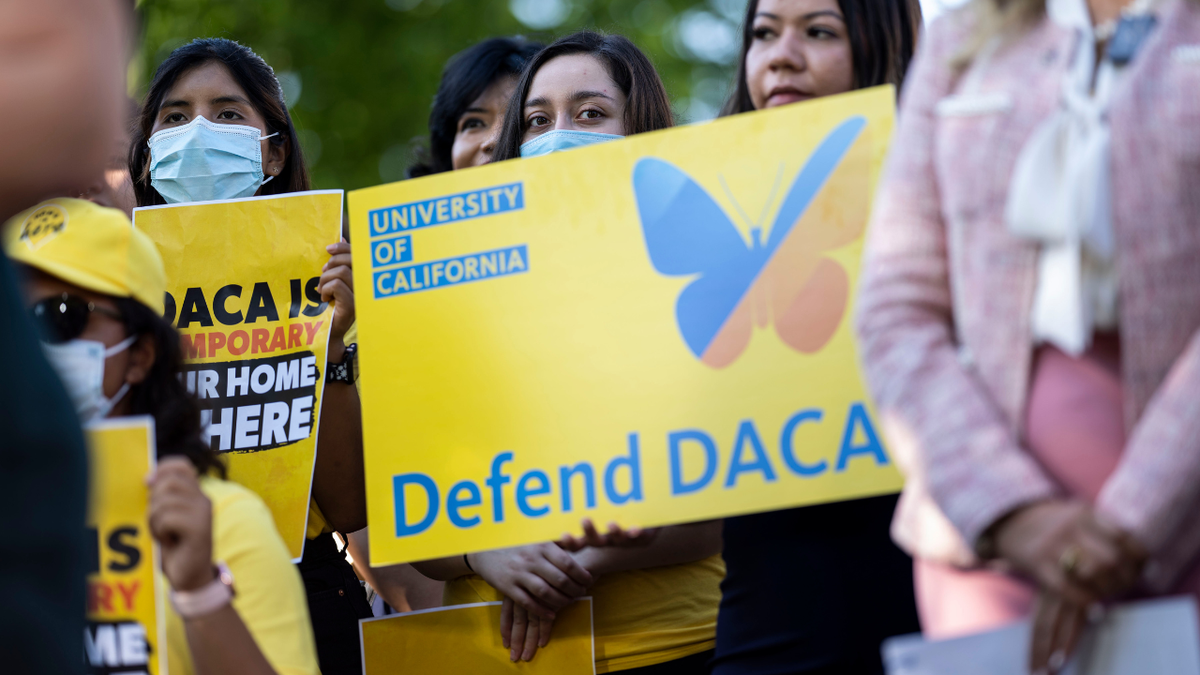Fox News Flash top headlines for October 6
Fox News Flash top headlines are here. Check out what's clicking on Foxnews.com.
A federal appeals court decision, issued Wednesday, that the Obama-era Deferred Action for Childhood Arrivals (DACA) program is illegal, marks the latest turn in the labored history of the controversial 2012 regulation.
The 5th Circuit U.S. Court determined that the Obama administration did not have the authority to institute the program – which grants protection from deportation for illegal immigrants who had come to the country as minors.
The three judge panel did not dismantle the policy, meaning that while it cannot process new applicants, those already enrolled are still protected from removal. Approximately 700,000 are estimated to have been granted protection under the program, and hundreds of thousands more are deemed eligible.
President Barack Obama controversially created the program through executive action, which was immediately criticized for being an overreach of executive power. Obama said the policy was in response to inaction by Congress to form a pathway to citizenship for those whom activists and some media outlets dubbed "Dreamers."

Activists listen during a news conference marking the 10th anniversary of the passing of Deferred Action for Childhood Arrivals (DACA), on Capitol Hill on June 15, 2022. (Kent Nishimura/Los Angeles Times via Getty Images)
"This is not amnesty, this is not immunity," Obama said announcing the move. "This is not a path to citizenship. It's not a permanent fix. This is a temporary stopgap measure that lets us focus our resources wisely while giving a degree of relief and hope to talented, driven, patriotic young people."
While Republicans accused Obama of overreach, immigration activists have complained that the measure has left immigrants in limbo for nearly a decade. The protection needs renewal every two years.
BIDEN ADMIN MOVES TO STRENGTHEN OBAMA-ERA DACA PROGRAM AMID LEGAL CHALLENGES
The hope from the left of an all-encompassing immigration reform bill, including amnesty for millions of illegal immigrants – including DACA recipients – has never come to fruition, unable to gather Republican support for amnesty provisions.
President Donald Trump’s administration sought to end DACA, although it offered a deal to Democrats that would extend the program in exchange for wall funding to end a government shutdown.
However, in June 2020, the Supreme Court blocked the administration’s efforts to end DACA, finding that its efforts to do so were in violation of the Administrative Procedure Act (APA), which sets out rulemaking for federal agencies.
President Biden entered office promising to defend DACA, taking executive action in the first days in office to do exactly that. He has also called for a comprehensive immigration deal with mass amnesty as a cornerstone.
But later in the year a Texas court ruled that the policy was unconstitutional, putting a freeze on new enrollments. The judge found that the agency's interpretation of statutes was "overly broad" and those laws did not carry the authority for the federal government to institute the program.
"DACA would grant lawful presence and work authorization to over a million people for whom Congress had made no provision and has consistently refused to make such a provision," Judge Andrew Hanen wrote. The 5th Circuit panel upheld that ruling.
However, in August the Biden administration made changes to the program via a new regulation. Under the new rule, the substance of DACA remains mostly the same in practice, but it is being issued in October in response to a public comment period, which places it more in line with the APA. The rule reaffirms the claim that DACA is not a form of lawful status like a visa, but views DACA recipients as "lawfully present" for certain purposes. The 5th Circuit sent the case back down to the lower court to consider the changes.
Biden renewed his call for a pathway to citizenship from Congress and said that while the ruling remains a temporary reprieve for recipients, "one thing remains clear: the lives of Dreamers remain in limbo."
CLICK HERE TO GET THE FOX NEWS APP
As for the way forward for the program, the administration said it was still reviewing its options.
"I am deeply disappointed by today’s DACA ruling and the ongoing uncertainty it creates for families and communities across the country," Homeland Security Secretary Alejandro Mayorkas said. "We are currently reviewing the court’s decision and will work with the Department of Justice on an appropriate legal response."
Fox News' Adam Sabes and David Spunt contributed to this report.
















































